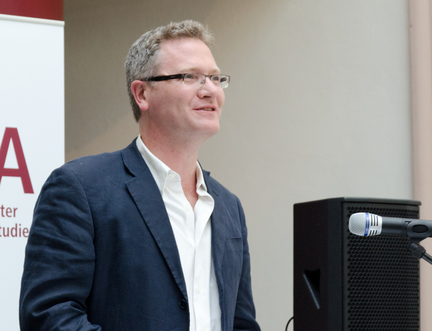More articles Sunday 26 August 2018 11:00am
The 2008 global ‘banking heart attack’ was an economic ‘Cuban Missile Crisis’, says Adam Tooze

The world could well have ended, economically, in 2008, according to Adam Tooze. The Columbia University Professor of History, and author of Crashed, was speaking yesterday with BBC Scotland’s Business and Economics Editor Douglas Fraser about the seismic global financial crisis of 2008, at a sold-out event at the Edinburgh International Book Festival.
“People don’t quite understand the radicalism of what we’re dealing with here,” he said, talking about the economic crisis triggered 10 years ago when global financial services company Lehman Brothers filed for bankruptcy. “All banks are incredibly fragile things; by their very nature – even if they’re incredibly well run, even if they’re lending only to incredibly good borrowers, even if all their investments pay out – all it takes is for one little Mary Poppins kid to say ‘I need my tuppence’, and for everyone to get the impression that they can’t have their tuppence, and the City of London will fall down.
“That’s what happened in 2007/08; a global banking ‘heart attack’, far, far more severe than any bank run we saw during the Great Depression, because it was so many banks, all over the world, over a period of not four years, but days—if not hours,” Tooze said. “This is more like a ‘Cuban Missile’ event; in other words, the world could have ended, economically, in that period. And of course our problem, in retrospect when thinking how to situate the crash historically, is that it didn’t end. We took the counter-measures necessary, but we should know that from henceforth forward, we live in a world that experienced that near fatal heart attack, and experienced the emergency medicine necessary to stave off what appeared to be the inevitable end.
“That, to my mind, is why questions about ‘it’ happening again suggest that the person asking the question is really thinking of something more like regular business cycles in a more orderly universe. There may well be an orderly bout of economic flu coming to the US economy in the next couple of years – and there are trillions of dollars betting on precisely that – but what no one can really gauge just now is the probability of another systemic heart attack like the one we experienced in 2008.”
If nothing else, Tooze believes his approach to the subject reaffirms the interconnectedness of the US and Europe. “As difficult as the Americans may be to live with – and we’re now beginning to taste the full bitterness of that particular apple – it is also very difficult to live without them. What 2008 demonstrated is the Federal Reserve of the United States remains the anchor of the global financial system so long as that system is anchored in dollars.”
In response to an audience member’s question about the danger of climate change, Tooze agreed. “If my analogy basically means we’re recovering from a heart attack, why the hell are we talking about this issue of financial crisis when the real issue is that a forest fire is burning towards the hospital, the smoke from which is already obscuring the sun? The timelines on really dramatic, earth-shaking, geopolitically relevant climate change are measured in decades now. So, there is a real problem of retaining focus on what in fact are the most pressing issues: we’re a recovering heart attack patient in a hospital, endangered by fire, who is having brain surgery conducted by mad scientists!”
- 2026 Festival:
- 15-30 August
Latest News
 Major new partnership with Celtic Connections
Major new partnership with Celtic Connections



